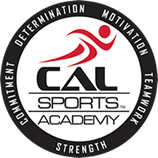
We have all heard the expression: You are what you eat. No truer words have ever been spoken when it comes to student-athletes and their performance.
While a healthy diet isn’t the magical key to success, a poor diet is a setup for failure.
Dr. Aaron Oberst, friend of CAL Sports Academy, Chiropractor, and Owner of Healthy Balance Chiropractic and Wellness Center and Dr. Drill Instructor, Inc., answered some of your questions regarding nutrition and provided tips to give you an edge on the competition.
What are some of the biggest mistakes you have seen families and student-athletes make regarding nutrition?
Well, we’ve all seen what the snack stands look like at tournaments, yes? Soft pretzels, pizza, candy, hot dogs – these things aren’t the devil and are acceptable in moderation, but they should be the exception in an athlete’s diet.
The biggest mistakes encountered are folks unapologetically eating junk. We’re all so busy and consequently, families don’t sit down enough together for meals, so they eat fast food or the equivalent that they heat up at home. Even with snacking, the norm seems to over-processed food, in lieu of a piece of fruit or some mixed nuts, for example.
What are some simple ways families and student-athletes can help avoid those mistakes?
Families should prioritize meals eaten (and prepared) together. We all do this to a degree, packing lunches and hopefully cooking at least one hot meal daily. But we could and should do a lot more of this.
Dinnertime is time well spent preparing healthy, whole foods. What kind of foods, you ask? Though we could all be a little more educated on what foods to eat and exactly how to prepare them, there are some hard and fast rules of the road which make healthy living less of a chore:
- Lose the soft drinks and fried junk. They’re pure sugar and fat. Soda and candy jack up your energy levels and then drop them precipitously. This is bad if you’re an athlete, because you want sustained energy. Eat fruit, trail mix and drink water as a base; treat yourself occasionally.
- Carbs must be complex. Eat lots of veggies and fruit. These provide complex carbohydrates, along with vitamins, minerals and fiber. You really can’t go wrong here.
- Proteins help you heal. During intense workouts, athletes tear up a lot of muscle tissue especially – protein consumption helps these tissues heal up so you can come back stronger and faster.
Note: A balanced diet already contains sufficient protein, so no need to run out to the health food store to load up on protein powder. A post-workout recovery shake is OK, however, as are bars. Just don’t rely upon these. Protein sources should be lean, in the order of nuts, fish, poultry, eggs, chicken, beef, pork.
Can a balanced and healthy diet improve performance? If so, how/why?
Bigtime. When we’re young, we tend to feel invincible and to a degree, we are. We have unlimited energy to play sports all day and are able to bounce back from injuries that a decade or so later in would put us permanently on the bench.
But nothing last forever, so particularly regarding our health, it is important to plan for the future. We can all improve, and the small adjustments to your diet will pay off, giving you an edge on the competition. You will find yourself with more energy and faster recovery and greater stamina – that is the name of the game in any sport.
When a patient asks for a few quick tips regarding nutrition, what do you tell them?
I tell them the above and commend them on taking interest in their health and the maximization of their performance. A mantra that I use in my life is, “What You Put In, You Get Out!” Performance nutrition is not rocket science, it’s a matter of educating oneself, and the rest is discipline.
Read more from our Path to Success Blog.
